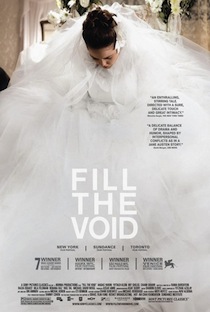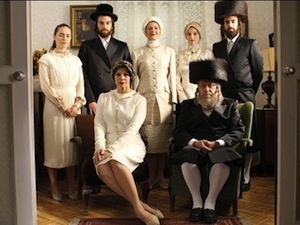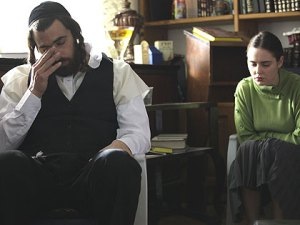 One of the biggest assets of film as an art form is its ability to bring accessibility to otherwise impenetrable subject matter. A viewer thrown into anything from a foreign culture to outer space can find firm footing with a solid story. For all it’s faults, Israeli drama Fill the Void’s biggest strength is how it confidently plants its viewers in an almost impenetrable tradition, but never leaves the audience confused or confounded.
One of the biggest assets of film as an art form is its ability to bring accessibility to otherwise impenetrable subject matter. A viewer thrown into anything from a foreign culture to outer space can find firm footing with a solid story. For all it’s faults, Israeli drama Fill the Void’s biggest strength is how it confidently plants its viewers in an almost impenetrable tradition, but never leaves the audience confused or confounded.
Set in Tel Aviv, Israel, Fill the Void chronicles the life of Shira Mendelman (Hadas Yaron), an 18 year old girl raised in a Haredi Jewish community with her ultra-Orthodox family. Shira pines for a loving marriage similar to that of her sister Esther (Renana Raz). When the older sibling dies during childbirth, Shira’s arranged marriage falls apart and Esther’s husband, Yochay (Yiftach Klein), is left a single father. With Yochay and Shira now unmarried, a disastrous faux pas in this society, Shira’s mother Rivka (Irit Sheleg) begins pressuring her daughter into marrying her brother-in-law to prevent a falling out in the community and to keep Yochay’s son Mordechai in the family.
 Written and directed by Rama Burshstein, now considered to be the first female orthodox Jewish director of a mainstream film, Fill the Void maintains accessibility and intrigue throughout with some great performances and a fantastic script. Despite the closed nature of this religious community, Burshstein crafts a film full of multi dimensional characters that are consistently interesting. The director also uses the very nature of a repressed community to her advantage; establishing early on the quiet reserved nature of her characters. The distant temperament of the story emphasizes the emotions that manage to bubble to the surface, with multiple instances of nail biting drama provided by simple interactions and quiet outbursts.
Written and directed by Rama Burshstein, now considered to be the first female orthodox Jewish director of a mainstream film, Fill the Void maintains accessibility and intrigue throughout with some great performances and a fantastic script. Despite the closed nature of this religious community, Burshstein crafts a film full of multi dimensional characters that are consistently interesting. The director also uses the very nature of a repressed community to her advantage; establishing early on the quiet reserved nature of her characters. The distant temperament of the story emphasizes the emotions that manage to bubble to the surface, with multiple instances of nail biting drama provided by simple interactions and quiet outbursts.
Yaron has received a heap of well-deserved praise for her powerful turn as Shira. Playing the character with all of the anxieties one would expect, not just from a young orthodox Jew, but also those of any teenage girl. Yaron gets most of the big emotions, but on the other hand it’s Yiftach Klein’s Yochay that plays the film’s quiet moments with skill. Watching the two play off of each other is one of the film’s consistent delights.
That being said, Fill the Void is not perfect by any means. While the actors and script are compelling, Burshtein’s direction is ultimately too mannered. Most shots in the film are staged to an excessive degree recalling a French new wave film or postmodern indie drama in their clean composure. Please take note that those are two genres of film interested in self-aware filmic deconstruction, which certainly doesn’t seem to be Fill the Void’s goal. While never a deal breaker, this overly calculated staging frequently prevents the viewer from completely erasing the fourth wall. Burshstein has an eye for painterly composition for sure, but it only hinders the audience in accepting the naturalism of the writing.
 Worse than the composition is the cinematography from director of photography Asaf Sudri, who shoots almost every shot with a dream like bloom radiating from the over exposed highlights and a razor thin depth of field. The tripping-the-light-fantastic flares also interferes with the film’s sense of naturalism and neutrality.
Worse than the composition is the cinematography from director of photography Asaf Sudri, who shoots almost every shot with a dream like bloom radiating from the over exposed highlights and a razor thin depth of field. The tripping-the-light-fantastic flares also interferes with the film’s sense of naturalism and neutrality.
The incredibly shallow focus is worse as it is frequently just aggravating. I can guess that the depth of field is meant to reinforce the sort of cold isolation between the characters and while I can buy that idea conceptually, the technique is simply pushed too far. In several scenes characters try to impart important dialog only to drift in and out focus, worse is when characters try to say something while standing in the background of the shot. We watch as compelling performers are reduced to giant undulating blurs.
None of that compares to when the focus is simply on the wrong object in the scene, because of the profound difficulty in pulling focus with such a soft depth of field. In one poignant moment where Rivka cradles her daughter in bed the two converse as the camera focuses on neither of their faces but instead on Rivka’s right shirt sleeve. Again, this isn’t a deal breaker, but it was irritating.
 Finally, one can’t review Fill the Void without discussing the politics of the whole affair. Fill the Void’s most common criticism, arguably, is the fact that Burshstein never really takes a stance on the matter of how women are viewed in the Haredi Jewish community. Despite the film’s numerous female characters, none of them are shown to have any interest in bucking what is obviously a patriarchal society. In fact most of them, including the lead, have a romantic notion of being brought further into traditional fold. Obviously it would be more empowering for Shira to pack her bags and get out of dodge when her mother begins to pressure her into a rather odd marriage proposal. At the same time, that is obviously fantastical given the nature of this community in real life.
Finally, one can’t review Fill the Void without discussing the politics of the whole affair. Fill the Void’s most common criticism, arguably, is the fact that Burshstein never really takes a stance on the matter of how women are viewed in the Haredi Jewish community. Despite the film’s numerous female characters, none of them are shown to have any interest in bucking what is obviously a patriarchal society. In fact most of them, including the lead, have a romantic notion of being brought further into traditional fold. Obviously it would be more empowering for Shira to pack her bags and get out of dodge when her mother begins to pressure her into a rather odd marriage proposal. At the same time, that is obviously fantastical given the nature of this community in real life.
I found Burshtein’s ambiguous take on the issue compelling if only because it seems clear that the film is not particularly interested in political subterfuge. The story appears less as a social statement and more as simply an emotional drama set in faithfully recreated reality that the director no doubt has some experience in. Burshstein is not only an orthodox Jew, but the film is actually dedicated to her husband. The film’s most compelling scene happens when Yochay sits down to interview Shira about the possibility of marriage. After he relaxes and opens up about his feelings, an action looked down upon in the community, Shira breaks down and confesses that she is still uncommitted and confused in relation to the union. Yochay’s frustration at forgoing his emotion is palpable and Shira’s response is heartbreaking. Strip away the political aspects and the scene becomes less about traditional marriages and more about two people who have a fundamental fear of being alone. It’s powerful stuff and it’s in these instances of genuine emotional connections that Fill the Void excels.





Comments on this entry are closed.